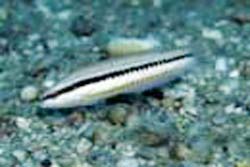An (ecological) origin of species for tropical reef fish

Dealing a new blow to the dominant evolutionary paradigm, Luiz Rocha and colleagues from the Smithsonian Tropical Research Institute, Harvard University the University of Florida and the University of Hawaii, report coral reef fish from neighboring habitats may differ more from one another than from fish thousands of miles away. An ecological speciation model for coral reef organisms may spur the development of a more synthetic treatment of speciation on land and sea.
Coral reefs, like tropical forests, express an extreme of life’s capacity for variation. Yet high biodiversity in tropical seas foil evolutionists’ attempts to explain the splitting of one species into two on the basis of geographical barriers. According to standard evolutionary theory proposed by Dobzhansky and Mayr more than 50 years ago, mountain building, island formation, glaciation and other processes isolate populations within a species. Over evolutionary time, these populations mutate independently until individuals from distinct populations can no longer interbreed and become new species.
What explains the evolution of a huge number of closely related fish species on reefs in an open undersea world where currents constantly stir the waters, washing in fish or their larvae from afar, a world without well-defined geographical barriers? Rocha et al. took a close look at the genetics of one group of Western Atlantic tropical reef fishes (wrasses, genus Halichoeres) throughout their range and were surprised by what they found.
Rocha explains: “I was interested in the Amazon barrier. The Amazon and Orinoco’s freshwater and sediment discharge off of northeastern South America is so immense that it precludes coral reef formation from the mouth of the Amazon North to Trinidad and Tabago. This 2000 km gap is believed to be a strong barrier for corals and associated reef organisms.”
“My idea was to test whether or not wrasses in the genus Halichoeres were genetically different North and South of this barrier. Since all of these species have similar abilities to disperse, I expected to find genetic differences that corresponded to the barrier in all of them, but, surprisingly, that wasn’t the case.”
Mitochondrial DNA of adult fish and larvae from three locations in the Caribbean and from three locations in Brazil showed much clearer genetic differences within, rather than across, the two sides of the Amazon barrier. Genetically similar fish were found in ecologically similar habitats–even thousands of miles apart.
Wrasses collected only 360 km apart along the Brazilian coast were genetically more distinct than were fish collected 4200 km apart, from Fernando de Noronha island off of the Brazilian coast and St. Croix in the Caribbean.
The fact that evolutionary partitions correspond more closely to habitat type, rather than to conventional geographical barriers, indicates that local speciation events may overcome the homogenizing effect of migration in the ocean, vindicating Darwin’s original ideas about the importance of ecological speciation in biodiversity evolution.
Media Contact
All latest news from the category: Ecology, The Environment and Conservation
This complex theme deals primarily with interactions between organisms and the environmental factors that impact them, but to a greater extent between individual inanimate environmental factors.
innovations-report offers informative reports and articles on topics such as climate protection, landscape conservation, ecological systems, wildlife and nature parks and ecosystem efficiency and balance.
Newest articles
Humans vs Machines—Who’s Better at Recognizing Speech?
Are humans or machines better at recognizing speech? A new study shows that in noisy conditions, current automatic speech recognition (ASR) systems achieve remarkable accuracy and sometimes even surpass human…

Not Lost in Translation: AI Increases Sign Language Recognition Accuracy
Additional data can help differentiate subtle gestures, hand positions, facial expressions The Complexity of Sign Languages Sign languages have been developed by nations around the world to fit the local…

Breaking the Ice: Glacier Melting Alters Arctic Fjord Ecosystems
The regions of the Arctic are particularly vulnerable to climate change. However, there is a lack of comprehensive scientific information about the environmental changes there. Researchers from the Helmholtz Center…



